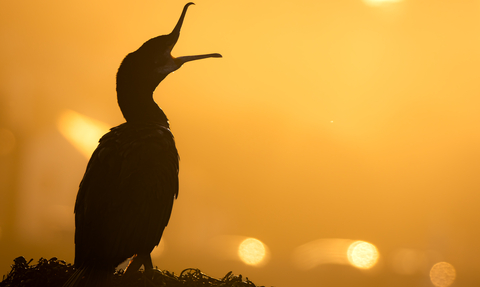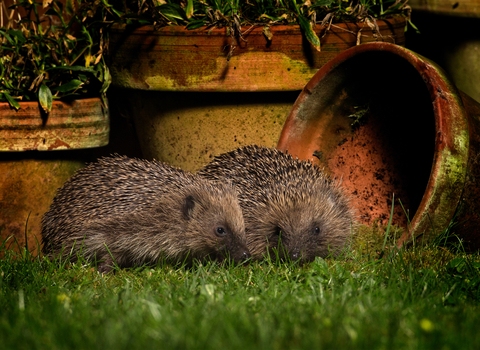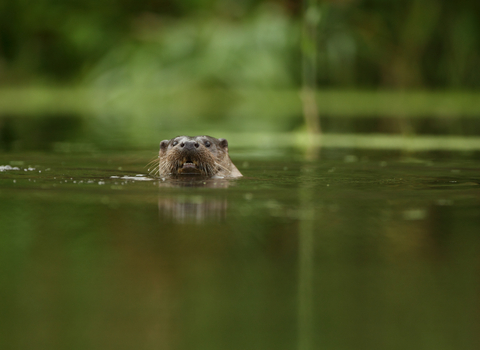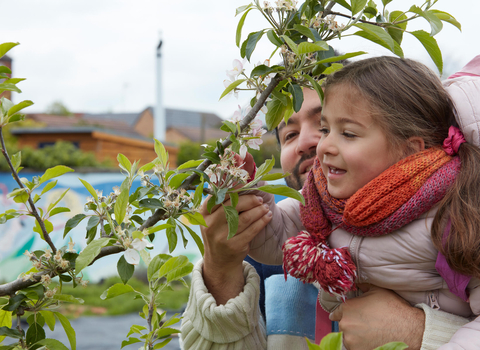
(C) Great cormorant, Ben Hancock-Smith
Election asks
The next parliament will be critical for Cornwall’s wildlife. Despite national targets to halt species loss, many habitats are in poor condition and 15% of species are at risk of extinction. Our message to all political parties is that nature and climate targets are not just ‘nice-to-haves’ that we can ignore. Meeting these targets is essential to maintaining a habitable planet and time is not on our side.
Listen to Cheryl Marriott, Director of Nature and People, discuss these asks in more detail on The Wild Cornwall Podcast.

© Jon Hawkins Surrey Hills Photography
ASK 1: Bring back the UK’s lost wildlife
The next UK Government must work across departments to put nature into recovery by protecting and restoring at least 30% of land and sea for nature by 2030. Current totals are considerably below 30% and many protected areas are in poor condition and isolated from others.
Make more space for nature
Figures suggest 21% of land in Cornwall is in positive management for nature1. Whilst this is better than the national average it is not enough to reverse wildlife decline. The State of Nature Cornwall 2020 report found that 12% of species of principal importance are threatened with local extinction or complete loss, and nearly half of terrestrial mammal species and more than half of butterfly species are found in fewer places now than 30 years ago. Shockingly, the rate of species decline is not slowing; we will need to work together on bigger and bolder approaches if we are to reverse these trends. We need a comprehensive nature recovery network to protect and restore the best wildlife sites as well as creating large areas of new wildlife-rich habitat.
Stop damage to Marine Protected Areas
At sea, only 7% of Cornish waters have any management measures in place to protect marine habitats and species. Even within Marine Protected Areas (MPAs) damaging activities are still happening because management measures are often focused on specific habitat features rather than on the sites as a whole. Bottom-trawling and other damaging fishing practices should be prohibited in MPAs to allow marine habitats to recover. In the wider seas, damaging fishing practices need to be properly managed to allow for long-term improvements to fish stocks. There is more development pressure on marine ecosystems than ever before, but current marine spatial plans are already obsolete. They are not compatible with new ambitions for floating off-shore wind generation for example, nor do they identify areas where development could be most sustainably located. We need marine spatial plans with nature recovery at their heart, with all other activity planned in a way that protects and enhances marine species and habitats.
Bring back beavers
Evidence demonstrating the positive impact that Eurasian beavers can have on biodiversity and down-stream flooding continues to mount up, yet still our Government is not accepting applications for well-planned wild beaver releases, even where the benefits far outweigh any negatives. Several local enclosed beaver reintroduction trials in Cornwall show that we have much to gain from allowing these animals to return. Beaver dam building in upper catchments can reduce downstream flooding, diversify in-stream habitats to benefit fish and other wildlife, and help to make our rivers and streams more resilient to climate extremes, by moderating both storm-induced high flows and drought-induced low flows. We will need to be ready to monitor and quickly mitigate any negative impacts, but we have the relevant knowledge and skills in Cornwall and Beaver Management Groups are already being set-up. Numerous European countries, including Scotland, have already successfully adjusted to living alongside beavers once more. It is time for our Government to grant wild beaver reintroduction licenses.

Luke Massey
ASK 2: Tackle river and coastal pollution
The next UK Government must sufficiently fund enforcement agencies to do their job. By 2030, pollution from farming, sewage and development must be halved and ‘forever chemicals’ strictly limited.
Halve nutrient pollution by 2030
Over a third of nutrient pollution in rivers nationally is caused by agricultural run-off, with direct input of sewage, chemicals and plastics also leading to waterbody contamination. There are many examples in Cornwall where farmers and conservationists are working in partnership to reduce pollution, but even so, only 24% of Cornish rivers and 15% of our lakes were classed as having ‘good’ status in 2019.
Enforce the law
Water pollution negatively impacts freshwater and marine habitats and species, as well as human health. Poor water-quality is thought to be a contributing factor in the long-term decline of salmon in Cornwall for example, and last summer salmon stocks were reported nationally as reaching crisis-point. Whilst sea swimming brings many positive benefits to human-health, it is also associated with higher rates of ear and gastrointestinal illnesses caused by sewage pollution. Additional Government investment in land management incentives (see point 3 below) is essential, but so is investment in monitoring and enforcement to ensure the worst polluters from all sectors are held to account.
Strictly control ‘forever chemicals’
Long-lasting pollutants are a growing concern, particularly the group of chemicals known collectively as PFASs (per- and poly-fluoroalkyl substances). An analysis of official Environment Agency data revealed that many English river sites would fail new EU proposed safe levels for these substances. A study of 50 dead otters found PFASs in the livers of all of them, and 12 different types of PFASs in more than 80% of samples. We have not learnt lessons from long-banned chemicals like PCBs (Polychlorinated biphenyls). High concentrations of PCBs are still being detected in marine mammals in Cornwall 30 years after their use was banned, and they have been linked to reduced fertility in dolphin, porpoise and whale species. We want to see existing and future forever chemicals strictly controlled.
Cornwall Wildlife Trust works with hundreds of farmers and landowners, Image by Cornwall Wildlife Trust
ASK 3: Fund nature-friendly farming
The national budget for nature-friendly farming should increase to at least £4.4 billion a year to meet environmental goals, alongside supporting farmers to halve pesticide use by 2030 and adapt to climate change.
Double the budget for wildlife-friendly farming
It will be impossible in Cornwall to halt the decline of wildlife, restore healthy ecosystems and achieve net zero greenhouse gas emissions without a fundamental transformation in the way land is managed. With low incomes in many parts of the agricultural sector in Cornwall, we need clear incentives to support the move towards more nature and climate friendly farming practices. There is a growing interest in nature friendly farming locally, and numerous examples of farmers reducing pesticide and artificial fertiliser use, restoring soil health and making space for wildlife, but more government investment is needed to deliver change at the pace and scale needed.
The current budget is based on historical allocations and is not enough. Analysis of the funding need shows that we need to double the existing amount. This would be in all our interests; our food production is reliant on thriving natural systems to provide healthy soils, safe and plentiful water, beneficial pollinators, and a stable climate. We do not need to choose between food production and wildlife recovery; they can and should go hand-in-hand.
Halve pesticide use
We want to see all bans maintained on bee-killing and human-health harming neonicotinoids. Many farmers in Cornwall are switching to more regenerative methods and reducing their use of pesticides. This is good news for both human and wildlife health and we want to see farmers supported to halve their use of pesticides by 2030.
Help farmers adapt to climate change
Farming with nature can increase resilience to extremes of climate. In Cornwall, for example, herb-rich grasslands are increasingly being used by beef farmers to improve soil health and provide habitat for pollinating insects. Healthier soils are better able to withstand both heavy rainfall and periods of drought, so farming with nature in mind is a win-win.

Unsplash
ASK 4: Tackle the climate emergency by protecting and restoring natural habitats
In addition to investing in energy efficiency to reduce emissions and people’s bills, the next UK Government must integrate climate adaptation strategies across all departments, create a nature recovery network to help wildlife adapt to change and protect marine and coastal carbon stores from damage. The global climate and nature crises are inter-linked; climate change is driving nature’s decline, and the loss of wild spaces is leaving us ill-equipped to sequester and store carbon and to adapt to the changes we are already experiencing. Some degraded habitats are actively emitting carbon instead of storing it.
Upgrade energy efficiency for homes
The UK Government has legislated for net zero emissions by 2050. To date, policy ambition and delivery remain off-track to achieve this and over the last year a key opportunity to raise the overall pace of delivery has been missed. The next parliament must address this as a matter of urgency. We want to see rapid expansion of retrofit schemes to reduce emissions and energy bills, this is one of the most straightforward and cost-effective ways to reduce emissions.
Help nature and people adapt to climate change
The most recent UK climate adaptation assessment, based on an independent report by the Climate Change Committee, listed risks to the natural environment as among the most urgent adaptation priorities for the UK. The Cornwall Climate Change Risk Assessment identifies that Cornwall’s wildlife-rich habitats are likely to be affected in multiple ways: the impacts of drought, new pests and diseases, rising sea levels squeezing coastal habitats, more frequent periods of extreme heat and increased storminess. Government support is needed to address climate change risk to Cornwall’s species and habitats and to take swift adaptation action and make habitats more resilient.
Protect our Blue Carbon
Marine and coastal ecosystems are at risk from both direct damaging activity at sea and indirectly from pollution washed in from the land. Together these threaten marine wildlife and reduce the potential of habitats to sequester and store carbon. Seagrass beds, for example, are vulnerable to pollution from sources on land as well as direct damage from boat mooring and destructive methods of fishing. We know how to improve water quality and avoid damage to these vital habitats, and we have successful trials to restore seagrass beds in Cornwall which could be scaled-up with the right support and policies in place.

ASK 5: Enable healthy, nature-rich communities
The next UK Government must support the creation of more nature-rich and accessible greenspace, fund community-based health services to save the NHS money and give every child the best start in life by increasing outdoor learning opportunities.
A right to a healthy and natural environment guaranteed through law
The loss and degradation of greenspace and pollution of the air and water threatens everyone’s health and is cutting lives short, especially for the most economically disadvantaged. We would like all communities in Cornwall to have easy access to nature-rich greenspace. Cornwall Council’s successful Making Space for Nature project shows what can be achieved with the right investment. Scientific studies over many years show a positive link between nature and good mental and physical health. But it’s through connecting with nature - appreciating it and building a relationship with our natural environment – that the benefits are most profound. Connecting with nature can reduce stress, anxiety, depression and fatigue. It can also boost our immune systems, encourage us to be more physically active and it may reduce the risk of chronic disease.
Commit to funding the expansion of community-based health services
The NHS in Cornwall has set up various social-prescribing initiatives, including nature-based social prescribing. This involves helping patients to improve their health, wellbeing and social welfare by connecting them to various community services. Nature-based social prescribing involves participants getting out in nature and can positively impact on happiness and wellbeing and reduce social isolation. Nature-based social prescribing improves people’s health and saves the NHS money. It could also increase the number of people who care for and take action for, Cornwall’s wildlife. We would like to see increased investment in communities to enable more delivery of social-prescribing activities in local parks and gardens, nature reserves and community growing centres.
Give every child the best start in life
Outdoor learning improves child development, supports mental health and wellbeing, deepens nature connection and promotes more inclusive and engaging learning. Many children in Cornwall now benefit from ‘forest schools’ and other outdoor learning opportunities, but not all. We want outdoor learning to be a regular part of every child’s education.
